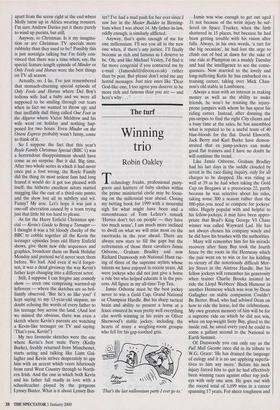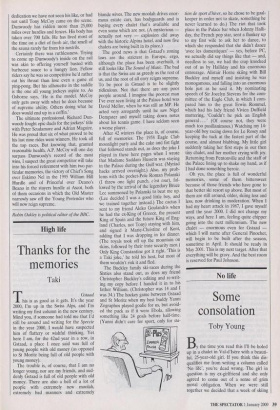The turf
Winning trio
Robin Oakley
Technology freaks, professional party- goers and knitters of baby clothes within the prime ministerial circle may be focus- ing on the millennial year ahead. Closing my betting book for 1999 with a mournful sigh for what might have been and a remembrance of Tom Lehrer's remark `Horses don't bet on people — they have too much sense', I am much more inclined to dwell on what we will miss most on the racetracks in the year ahead. There are always new stars to fill the gaps but the retirements of those three cavaliers Jamie Osborne, Graham Bradley and now Richard Dunwoody rob National Hunt rac- ing of three of the supreme stylists whose talents we have enjoyed in recent years. All were jockeys who did not just give a horse a ride but who helped educate it in the pro- cess. All figure in my all-time Top Ten.
Jamie Osborne must be the best jockey never to win a Gold Cup, Grand National or Champion Hurdle. But his sharp tactical brain and ability to present a horse at a fence ensured he won pretty well everything else worth winning in his years as Oliver Sherwood's stable jockey, including the hearts of many a weighing-room groupie who fell for his gap-toothed grin.
`That's the last millennium party I ever go to.' Jamie was wise enough to get out aged 31 not because of the wrist injury he suf- fered on Space Trucker, when the limb shattered in 15 places, but because he had been getting trouble with his vision after falls. Always, in his own words, 'a tart for the big occasion', he had lost the urge to climb out of bed at dawn for the sake of one ride at Plumpton on a muddy Tuesday and had the intelligence to see the conse- quences. Now married to the lovely and long-suffering Katie he has embarked on a training career, taking over Mick Chan- non's old stable in Lambourn.
Always a man with an interest in making money as well as the ability to make friends, he won't be training the injury- prone jumpers with whom he has spent his riding career. Instead, after donning the pin-stripes to find the right City clients and a busy time at the sales, he has assembled what is reputed to be a useful team of 40 blue-bloods for the flat. David Elsworth, Jack Berry and Karl Burke have demon- strated that ex jump jockeys can make good flat trainers and I have no doubt he will continue the trend.
Like Jamie Osborne, Graham Bradley had his last days in the saddle clouded by arrest in the race-fixing inquiry, only for all charges to be dropped. He was riding as well at 39 as he had when taking the Gold Cup on Bregawn at a precocious 22, partly because he was selective about his rides, taking some 300 a season rather than the 800-pluslou need to compete for jockeys' titles. Hugely popular with and helpful to his fellow-jockeys, it may have been appro- priate that Brad's King George VI Chase winner was called Wayward Lad. He has not always chosen his company wisely and he did have his brushes with the authorities.
Many will remember him for his miracle recovery after Suny Bay took the fourth fence by the roots in the Hennessy which the pair went on to win or for his kidding to victory of the notoriously difficult Mor- ley Street in the Aintree Hurdle. But his fellow jockeys will remember his generosity when trainer Charlie Brooks insisted he ride the Lloyd Webbers' Black Humour in another Hennessy which was won by Dean Gallagher on stable companion Couldn't Be Better. Brad, who had advised Dean on how to ride the horse, led the celebrations. My own greatest memory of him will be for a supreme ride on which he did not win, when on top-weight Suny Bay, glued to the inside rail, he saved every yard he could to come a gallant second in the National to Earth Summit.
Of Dunwoody you can only say as the Pall Mall Gazette once did in its tribute to W.G. Grace: 'He has drained the language of eulogy and it is no use applying superla- tives to him any more.' Before his neck injury forced him to quit he had effectively been winning races against other top jock- eys with only one arm. He goes out with the record total of 1,699 wins in a career spanning 17 years. For sheer toughness and dedication we have not seen his like, or had not until Tony McCoy came on the scene. Dunwoody has ridden more than 25,000 miles over hurdles and fences. His body has taken over 700 falls. He has lived most of the time on a diet of fresh air, the smell of the sauna rarely far from his nostrils.
Certainly there was ruthlessness. Trying to come up Dunwoody's inside on the rail was akin to offering yourself basted with barbecue sauce to a hungry lion. Fellow riders say he was so competitive he'd rather cut his throat than lose even a game of ping-pong. But his silhouette in the saddle is the one all young jockeys aspire to. As Osborne says, 'He is the model. McCoy only gets away with what he does because of supreme ability. Others doing what he does would end up in a coffin.'
The ultimate professional, Richard Dun- woody fought epic duels for the jockeys' title with Peter Scudamore and Adrian Maguire. He was proud that six of what proved to be his last nine rides were winners. He took all the top races. But knowing that, granted reasonable health, A.P. McCoy will one day surpass Dunwoody's record of the most wins, I suspect the great competitor will take into his forced retirement with him two par- ticular memories, the victory of Chief's Song over Eskimo Nel in the 1995 William Hill Hurdle and of Princeful over Deano's Beano in the stayers hurdle at Ascot, both of them occasions in which the Old Master narrowly saw off the Young Pretender who will now reign supreme.
Robin Oakley is political editor of the BBC.



















































 Previous page
Previous page